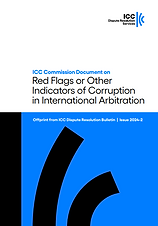
Arbitration
Arbitration is a form of alternative dispute resolution (ADR) where parties in a dispute agree to resolve their issues outside of traditional court systems. Instead of a judge, a neutral third party, called an arbitrator, is selected to hear the evidence and make a binding decision. The process is typically less formal than court proceedings, often faster, and may be more flexible in terms of rules and procedure.
ICC Arbitration assures the best quality of service. That is because it is delivered by a trusted institution and a process guided by the ICC Rules of Arbitration that is recognised and respected as the benchmark for international dispute resolution.
Anyone can benefit from ICC Arbitration’s flexibility and effectiveness. The only requirement for a party to be able to benefit from ICC Arbitration is to consent to its use in a contract, treaty or separate arbitration agreement even if such consent is normally handled through a contract or treaty entered into before a dispute arises, it may also occur after a dispute has taken place as well.
Unrivalled in experience and expertise, the ICC Court and its Secretariat are always ready to assist parties and arbitral tribunals with any questions relating to the conduct of the arbitration, and strive to ensure ICC awards are enforceable.
Advantages of Arbitration

Binding decision
Faster resolution


Cost-effective
Specialised expertise of arbitator(s)


Flexibility
Confidentiality


Enforceability of awards
Neutrality in international disputes

ICC Rules of Arbitration 2021
The ICC Rules of Arbitration 2021 introduce key updates aimed at improving procedural efficiency, transparency, and flexibility in international arbitration.
Notable changes include the increased use of technology, expedited procedures for smaller claims, and enhanced provisions for addressing conflicts of interest and ensuring fairness throughout the arbitration process.
ICC Dispute Resolution Bulletin
This edition of the Bulletin examines the role of arbitral institutions in upholding process integrity, promoting the rule of law, and ensuring access to justice.
It also explores cost-efficient awards for small- and medium-sized enterprises and addresses the legitimacy and fairness of arbitration procedures.
Cost of Arbitration
The cost of ICC Arbitration depends on several factors, including the amount in dispute, the number of arbitrators, and the complexity of the case. The main components of arbitration costs are:
ICC Administrative Fees
-
ICC charges a fixed administrative fee based on the amount in dispute.
-
The higher the dispute value, the higher the fee.
Arbitrators’ Fees
-
ICC arbitrators are compensated based on the time spent and the complexity of the case.
-
The fee structure follows ICC’s scale of arbitrators’ fees, which depends on the dispute’s value.
-
If there are three arbitrators instead of one, costs will be higher.
Legal Fees and other costs
-
Parties must pay for their legal representation, which varies based on law firms and jurisdiction.
-
Expert witnesses, translation services, and hearing venues add to the total cost.
Why did you lose?
Understand the Reasoning Behind Arbitral Awards.
In international arbitration, decisions are often final and rarely overturned — even when parties disagree with how facts were assessed or how the law was applied. This reality makes it all the more important to understand how and why arbitral tribunals reach their conclusions.
The ICC Institute's publication, “Explaining Why You Lost – Reasoning in Arbitration”, dives deep into this essential issue.
The discussions on this subject were held during the 39th Annual Conference of the ICC Institute on 17 December 2019. The program was prepared by two experienced members of the Institute Council, Antonio Crivellaro and Mélida N. Hodgson, who were able, with the support of contributors with huge expertise in their respective fields, to cover the various aspects of this fascinating subject and to provide practitioners and scholars with several new paths for reflection.
Whether you're a counsel, arbitrator, academic, or in-house advisor, this book offers valuable guidance for preparing stronger submissions, anticipating how arbitrators will approach your case, better explaining awards to clients or stakeholder and enhancing predictability and trust in the arbitral process.
Don’t just argue your case — understand how it’s judged.
Related publications

FAQ
What is ICC arbitration?
ICC arbitration refers to the process of resolving disputes through arbitration under the rules of the International Chamber of Commerce (ICC). The ICC provides a structured framework for parties to resolve their disputes through neutral arbitration, ensuring fairness and adherence to international standards.
How are arbitrators appointed in arbitration?
Arbitrators in ICC arbitration are typically appointed by the parties or, if the parties cannot agree, by the ICC Court. The ICC Court oversees the process and ensures that the arbitrators are qualified and impartial.
How long does the arbitration take?
The duration of ICC arbitration varies depending on the complexity of the dispute, but the ICC aims to ensure that cases are resolved as quickly as possible. The new expedited procedures allow for faster resolution of smaller disputes, typically within six months after the tribunal is constituted.
Are ICC arbitration awards enforceable internationally?
Yes, ICC arbitration awards are generally enforceable worldwide, thanks to the 1958 New York Convention, which facilitates the recognition and enforcement of arbitration awards in 172 countries. This makes ICC arbitration a preferred method for international dispute resolution.
Who pays for Arbitration?
Generally, the losing party pays the arbitration costs.The tribunal can also decide to split costs based on case circumstances.




